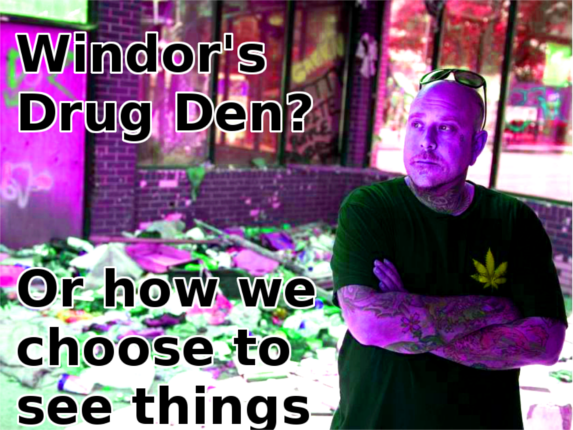Two prominent recent articles in The Windsor Star (one and two) describe a burnt out building on Wyandot St as a “drug den” and the people using the space as “a problem crowd” of “addicts” and push for the building to be demolished. The total lack of humanity in how the situation is described is striking. Drawing heavily on the words of local business owner Andrew Steptoe, it creates an opposition between good citizens like him – whose presence matters and whose voice counts – and the anonymous drug users who are portrayed as subhuman, represented only by photos of the garbage they leave behind, and who need to be driven away.
Andrew sets up an opposition between neighbours and drug users, as if people stop being part of your community when they have an addiction. He complains about the city deteriorating, as if people forced to live in a burnt out building don’t feel that much more keenly than he does. He talks about the safety of kids at a nearby school, as if drug users can’t also be parents and don’t care about children. It’s gross that I even need to say this, but Andrew is wrong – drug users are your neighbours, they are dealing with the same collective issues of poverty and public health as you, and they are part of families. What the actual fuck bro.
In the second article, the city of Windsor announces that it is going to knock the building down in the fall, as if that’s any kind of response to people living in crushing poverty. Across the region, people in power seem to agree that it’s not poverty that’s the problem, but groups of homeless people. Therefore, they don’t ask how to get people housed (or how to address the fundamental structural problems that lead to homelessness), they ask how to disperse people. In Hamilton, the police carry out regular evictions against groups of homeless people camping, some of whom staged a four-day-long protest downtown there demanding housing and that the raids against them stop. The protest camp was evicted.
Sticking together allows people to look out for each other, which increases your chances of having enough to eat, feeling safe at night, or, crucially, surviving an overdose. Dispersal often means death these days. The folks behind Moss Park Overdose Prevention Site in Toronto understood this and have created a resilient and persistent space of peer support for drug users that is super successful in keeping people alive by encouraging gathering for support.
If Andrew, the Windsor Star, and the city cared about “their community” as much as they claim, they would recognizing that dirty, unsafe conditions without access to harm reduction supplies is the problem, not the presence of human beings who use drugs. We’d see them pushing for sharps containers, garbage cans, tents, and sanitary washrooms, at the very least. Instead, we get some bullshit about needing to get rid of “places to hide and do drugs”.
Isn’t part of the problem that they have to hide? People are getting huge jail sentences for possession of opiates these days, it makes sense that drug users would hide. Andrew Steptoe posed for a picture wearing a cannabis leaf shirt, as if to announce that his memory is so short that he doesn’t recall a time that pot smokers also had to hide or else land in prison. Andrew’s story about people in the burnt building chasing away Andrew and another man who were trying to kick them out shows that people want to stay together and need safe places to use.
In Brant county meanwhile, the OPP commander describes addiction and mental health as forms of “social disorder” that need to be managed by new forms of policing that see them as sources of crime to be managed proactively. We’re presented with a choice then, between a world where communities care for all their members and see problems as shared responsibilities, or one in which policing strategies are deployed to disperse, jail, and manage people who are seen as inherently problems.
Sure, no one wants tons of used needles lying around, but the opiate and housing crises aren’t problems that are solved by knocking down a building. Let’s have each others’ backs, look at problems at the root, and resist attempts like the Star’s to dehumanize and drive out our neighbours.

